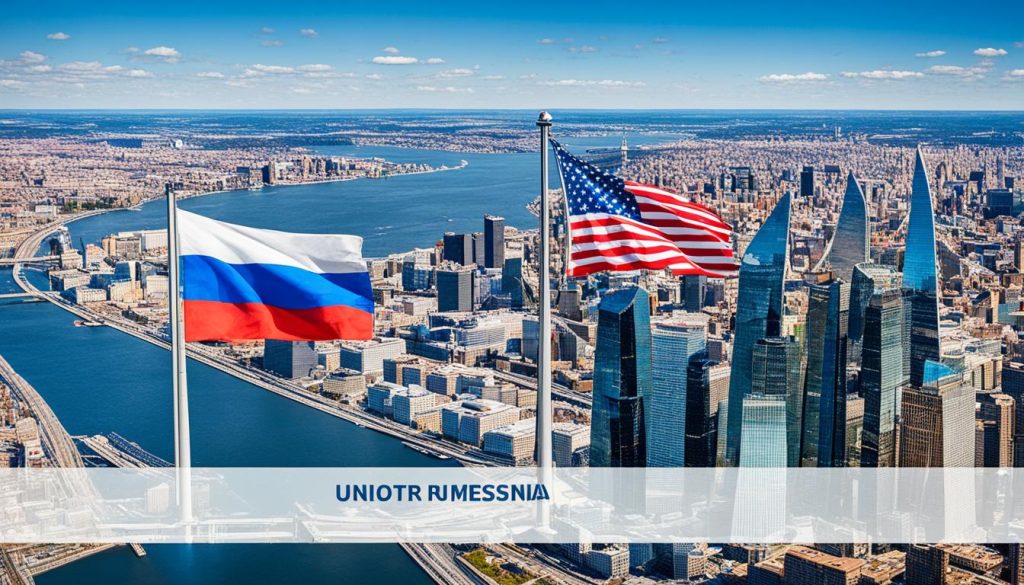The United States and the European Union have recently imposed a new round of sanctions on Russia, intensifying the pressure on the country. These sanctions are a direct response to Russia’s invasion of Ukraine and the tragic death of Kremlin critic Alexei Navalny.
The U.S. government has taken a firm stance by imposing approximately 600 new sanctions, targeting Russian firms involved in the war effort, financial institutions, and officials connected to Navalny’s death. Meanwhile, the European Union has implemented sanctions on foreign companies exporting goods to Russia that could potentially be used in its war against Ukraine. The EU has also targeted Russian officials responsible for the deportation and military re-education of Ukrainian children.
Key Takeaways:
- The United States and the European Union have imposed new sanctions on Russia in response to its invasion of Ukraine and the death of Alexei Navalny.
- The sanctions target Russian firms, financial institutions, and officials connected to the war effort and Navalny’s death.
- The European Union has also imposed sanctions on foreign companies exporting goods to Russia that could be used in the war against Ukraine.
- These sanctions aim to increase the pressure on Russia and hold it accountable for its actions.
- The long-term implications of these sanctions on US-Russia relations and global security remain uncertain.
Impact on US-Russia Relations
The imposition of new political sanctions by the Biden administration has further strained the already tense relationship between the United States and Russia. These diplomatic restrictions are a clear indication of the administration’s commitment to holding Russia accountable for its aggressive actions in Ukraine and other areas.
The Biden administration’s decision to impose these sanctions sends a strong message to the Russian government that acts of aggression will not be tolerated. By implementing these measures, the United States aims to deter future instances of Russian aggression and protect its national security interests.
However, the impact of these restrictions on US-Russia relations remains uncertain. It will largely depend on how Moscow chooses to respond. The Russian government may view these sanctions as an escalation and could respond in kind, further exacerbating the strained relationship.
It is essential to monitor the developments closely to see if these sanctions lead to any changes in the dynamic between the two countries.
These new sanctions demonstrate the Biden administration’s commitment to holding Russia accountable. The United States is sending a strong signal that it will not tolerate Russian aggression and will actively work to protect its interests.
Implications for Global Security
The imposition of sanctions on Russia has far-reaching implications for global security. The actions of the Russian government in Ukraine, as well as its support for authoritarian regimes, have raised significant concerns within the international community.
By imposing these sanctions, the United States and the European Union aim to curtail Russia’s ability to engage in aggressive behavior and promote stability in eastern Europe. The targeted restrictions on Russia’s foreign policy restrictions send a clear message that the international community will not tolerate violations of sovereignty and human rights.
These measures are not only intended to address the immediate issue at hand but also to serve as a deterrent to other countries that may consider similar actions. The global security concerns are not limited to the situation in Ukraine; they extend to any potential threat to stability and the well-being of nations.
“The imposition of sanctions on Russia as a response to its aggression is a critical step in maintaining global security. It signals a united front against actions that undermine sovereignty and human rights.” – International Security Expert
Furthermore, these sanctions demonstrate a commitment to upholding the principles of democracy and human rights that are fundamental to the international order. By holding Russia accountable for its actions, the international community aims to promote a safer and more secure world.
Global Security Concerns
| Threats to Global Security | Implications |
|---|---|
| Russian aggression in Ukraine | Destabilization of the region and potential for further conflict |
| Support for authoritarian regimes | Undermining human rights and democratic values |
| Violations of sovereignty | Challenges to the established international order |
| Threats to global stability | Compromising peace and security in various regions |
Addressing global security concerns requires collective action and cooperation among nations. By imposing restrictions on Russia’s foreign policy, the international community aims to safeguard global stability and promote the values that underpin our shared security.
Economic Impact of Sanctions
The economic impact of the US economic sanctions on Russia is substantial. These targeted sanctions have restricted the access of Russian firms and financial institutions to the global financial system, creating obstacles for them to conduct international business partnerships. As a result, Russia’s economy is experiencing negative consequences, such as reduced investment, capital flight, and slowed economic growth.
Furthermore, these sanctions have implications for global trade and investment. Countries and companies may be hesitant to engage with entities subject to sanctions, leading to a decrease in international trade and investment opportunities involving Russia.
Let’s look at some of the specific economic implications:
| Effects of US Economic Sanctions on Russia |
|---|
| 1. Reduced Investment |
| 2. Capital Flight |
| 3. Slowed Economic Growth |
| 4. Decreased International Trade and Investment |

These economic repercussions not only affect Russia but also have broader implications on the global economic landscape. As the economic ties with Russia weaken, countries worldwide may have to reconsider their trade relationships and investment strategies.
Putin’s Response
Russian President Vladimir Putin is expected to react to the recently imposed sanctions by the United States and the European Union. In the past, Russia has retaliated against Western sanctions by implementing its own set of restrictions, often targeting specific individuals and taking measures to assert its sovereignty. Putin’s response to these sanctions will play a crucial role in shaping the future trajectory of US-Russia relations and the ongoing conflict in Ukraine.
Update on Biden Sanctions
The Biden administration is closely monitoring the situation and evaluating its approach to the sanctions imposed on Russia. As the tensions persist, it is essential for individuals and stakeholders to stay informed about the latest developments surrounding the Biden sanctions and understand their impact on various aspects of US-Russia relations and global security.
The administration remains proactive in addressing the ongoing crisis and may implement updates or additional sanctions as necessary. Vigilance in following the updates is crucial to comprehending the complex dynamics at play and the potential repercussions for international relations. As the landscape evolves, it is imperative to stay abreast of new developments to gain a comprehensive understanding of the measures being taken.
By continuously assessing the efficacy of the existing sanctions and considering new actions, the Biden administration aims to demonstrate a steadfast commitment to addressing Russian aggression and ensuring global stability. The ongoing evaluation process reflects the administration’s dedication to protecting democratic values, human rights, and international security.
Overall, staying informed about the updates on Biden sanctions is essential for individuals, businesses, and policymakers to navigate the evolving geopolitical landscape effectively. By keeping a keen eye on the latest developments, it becomes possible to gain valuable insights into the ever-changing US-Russia relations and the broader implications for global security.
International Cooperation on Sanctions
The United States is actively collaborating with its international allies, with a specific focus on European countries, to synchronize efforts in imposing sanctions against Russia. This emphasis on international cooperation is crucial in exerting effective pressure on Russia and delivering a united message of condemnation for its actions. The Biden administration is engaging with other nations to foster consensus and garner support for potential additional sanctions, if deemed necessary.
This cooperative approach to sanctions underscores the commitment of the United States and its allies to address Russian aggression and promote global security. By pooling their resources and aligning their strategies, these nations aim to maximize the impact of the sanctions while minimizing the potential for retaliation.
“International cooperation is key in these challenging times. By joining forces and coordinating efforts, the United States and its European allies can exert significant pressure on Russia, demonstrating a unified front against its actions.”
The collaboration between the United States and its international partners serves as a robust diplomatic tool, effectively increasing the effectiveness of the sanctions. Furthermore, this joint effort sends a powerful signal to Russia that its actions are widely condemned and will not be tolerated by the international community.
Through ongoing discussions and consultations, the United States is actively seeking to strengthen the international coalition against Russian aggression. By fostering shared responsibilities, unity, and determination, these collective efforts aim to compel Russia to reconsider its destabilizing actions and foster a more peaceful international order.
Summary of International Cooperation on Sanctions
| Key Aspects | Actions Taken |
|---|---|
| Collaboration Between United States and European Allies | Coordination, consultation, and joint decision-making on sanctions |
| Consensus Building | Strengthening international coalition against Russian aggression through diplomatic efforts |
| Maximizing Pressure | Enhancing the impact of sanctions by pooling resources and aligning strategies |
| Deterrence | Sending a unified message of condemnation to Russia, deterring further aggression |
The international coordination on sanctions reflects a collective commitment to defending international norms, human rights, and democratic values. As the situation develops, it will be crucial to monitor the effectiveness of these joint efforts and evaluate their impact on global security and the future of US-Russia relations.

Evaluating the Effectiveness of Sanctions
There is ongoing debate and analysis regarding the effectiveness of economic sanctions and diplomatic measures as tools to achieve desired outcomes in international relations. While sanctions can impose economic and diplomatic pressure on targeted countries, their impact may vary depending on several factors.
Firstly, the resilience of the target country plays a crucial role in determining the effectiveness of sanctions. Some countries may be more adept at adapting to economic hardships and finding alternative sources of support, making it challenging for sanctions to have a substantial impact.
Additionally, the level of international support for the sanctions is another significant factor. If the targeted country can easily find alternate trading partners or secure financial support from other nations, the effectiveness of the sanctions may be undermined.
The specific objectives of the sanctions also contribute to their effectiveness. If the desired outcome is to change the behavior of a particular regime or force them to comply with certain international norms, then the sanctions need to be carefully designed to achieve those goals. However, if the objectives are unclear or unrealistic, the effectiveness of the sanctions may be limited.
It is crucial to assess the effectiveness of these sanctions over time and evaluate whether they produce the desired results. This analysis should go beyond short-term impacts and consider the long-term effects on the target country’s behavior and the broader geopolitical landscape.
“Sanctions alone have rarely succeeded in achieving their intended outcomes. They are most effective when combined with diplomatic efforts, engagement with international partners, and a comprehensive strategy to address the underlying issues.”
The effectiveness of sanctions is a matter of extensive research and policymaking, and it requires a thoughtful and nuanced assessment of their impacts.
Effectiveness of Sanctions in Recent History
Examining the effectiveness of sanctions in recent history can provide valuable insights into their potential outcomes. For example, the economic sanctions imposed on Iran in the past decade were instrumental in bringing the country to the negotiating table for the Joint Comprehensive Plan of Action (JCPOA) in 2015. The combination of economic pressure and diplomatic engagement played a crucial role in achieving a diplomatic resolution.
On the other hand, the efficacy of sanctions against North Korea has been a subject of intense debate. Despite multiple rounds of sanctions imposed by the international community, North Korea has continued to advance its nuclear weapons and missile programs, highlighting the limitations of sanctions in changing the behavior of a determined regime.
These examples underscore the importance of careful planning, international cooperation, and a comprehensive strategy when implementing sanctions. It is crucial to consider the context, objectives, and specific dynamics of each situation to assess the potential effectiveness of economic sanctions and diplomatic measures.
Evaluating the Long-Term Impact
Effectiveness of sanctions should be evaluated not only based on their immediate outcomes but also on the long-term impact they have on geopolitical dynamics and national security. This evaluation involves monitoring changes in the target country’s behavior, assessing the stability of the region, and examining any unintended consequences that may arise from the implementation of sanctions.
Furthermore, it is essential to consider the potential for diplomatic negotiations and engagement alongside economic sanctions. While sanctions can be an effective tool to pressure a country into compliance, they are more likely to succeed when combined with diplomatic efforts, dialogue, and international cooperation.
Long-term Implications for US Foreign Policy
The imposition of sanctions on Russia by the Biden administration reflects its broader foreign policy approach. These actions demonstrate the administration’s commitment to promoting democracy, human rights, and stability in the face of Russian aggression. The long-term implications for US foreign policy will depend on a variety of factors, including the effectiveness of the sanctions, Russia’s response, and the evolving geopolitical landscape.
The Biden administration’s decision to impose sanctions on Russia aligns with its strategic vision for the United States’ role in international affairs. By taking a strong stance against Russia’s aggressive behavior, the administration aims to protect the interests of the United States and its allies, deter future acts of aggression, and uphold democratic values.
The effectiveness of these sanctions will be key to shaping future US-Russia relations and influencing Russia’s behavior on the global stage. If the sanctions successfully deter further aggression and prompt a change in Russian behavior, they could serve as a template for future diplomatic actions. On the other hand, if the sanctions fail to produce desired outcomes or if Russia responds with retaliatory measures, the Biden administration may need to reassess its approach and consider other diplomatic channels.
The evolving geopolitical landscape will also play a significant role in shaping the long-term implications of these sanctions. As the global balance of power shifts and new challenges emerge, the United States will need to adapt its foreign policy strategies accordingly. The outcome of the US-Russia relationship will be contingent upon how both countries navigate these changes.
In conclusion, the imposition of sanctions on Russia by the Biden administration has significant long-term implications for US foreign policy. These actions demonstrate the administration’s commitment to promoting democratic values and stability in the face of Russian aggression. The effectiveness of the sanctions, Russia’s response, and the evolving geopolitical landscape will all contribute to shaping the future trajectory of US-Russia relations and influencing the Biden administration’s foreign policy decisions.
Evaluating Global Responses to the Sanctions
The response of other countries and international organizations to the sanctions imposed on Russia by the United States and the European Union will be closely watched. The global community is keen to see how countries with close ties to Russia, such as China, will react and whether they will join or oppose the sanctions. This evaluation of global responses is essential in understanding the impact and effectiveness of the measures taken.
China’s Position
“We respect the sovereign decisions of other countries, including the United States and the European Union, in implementing sanctions against Russia. However, China believes that dialogue and diplomatic solutions should be prioritized to address international disputes.”
China’s response will be significant, considering its economic and political relationship with Russia. The balance between maintaining its partnership with Russia and avoiding potential conflicts with Western countries will challenge China’s diplomatic stance.
International Cooperation
The need for international cooperation and collaboration in addressing Russian aggression and global security concerns cannot be understated. Close coordination among countries, especially those impacted by Russia’s actions, is crucial to ensure a united front.
The effectiveness of the sanctions depends not only on the actions taken by the United States and the European Union but also on the support and alignment of other countries. Joint efforts demonstrate a shared commitment to maintaining global security and deterring future acts of aggression.
Evaluating Effectiveness
Evaluating the effectiveness of the sanctions involves considering various factors, such as the response of targeted countries, the impact on global security, and the extent to which they deter Russian aggression. It is essential to assess whether the sanctions achieve the desired objectives and contribute to long-term stability.
Furthermore, the evaluation should examine the overall impact on international relations, including any potential ripples in alliances, trade partnerships, and diplomatic engagements. Understanding the multifaceted consequences provides valuable insights into the effectiveness of the sanctions in addressing global security concerns.
As the situation evolves, continued analysis and assessment of global responses will provide important indicators for future actions and measures to address Russian aggression effectively.
Conclusion
The recent imposition of new sanctions by the Biden administration and the European Union against Russia signifies a significant escalation in efforts to address Russian aggression and uphold global security. These measures specifically target Russian firms, financial institutions, and officials, aiming to amplify the consequences of their actions in Ukraine and other regions of concern. While the long-term ramifications for US-Russia relations and global security remain uncertain, the Biden administration is resolutely committed to holding Russia accountable and collaborating with its allies to tackle the challenges posed by Russian aggression.
Monitoring the impact of these sanctions and the responses from all the involved parties will be crucial as the situation continues to evolve. By implementing these diplomatic and economic measures, the United States and its allies seek to curb Russia’s aggressive behavior and promote stability in regions where global security concerns are paramount. By sending a resolute message to Russia and other nations, the international community underscores its intolerance for infringements on sovereignty and human rights.
As the geopolitical landscape evolves, the effectiveness of these sanctions will be a subject of ongoing debate and analysis. Although sanctions can exert economic and diplomatic pressure on targeted countries, their outcomes are contingent upon various factors such as the resilience of the target country, international support, and the specific objectives of the sanctions. Evaluating the long-term implications for US foreign policy will also depend on these factors, as well as Russia’s response and the prevailing geopolitical climate.
In conclusion, the imposition of new sanctions reflects the Biden administration’s broader foreign policy approach, demonstrating their unwavering commitment to promoting democracy, human rights, and stability in the face of Russian aggression. These diplomatic measures and economic sanctions signify an international effort to pressure Russia, advance global security, and unequivocally condemn its actions. As developments unfold, it is imperative to remain informed about the impact of these sanctions and their repercussions on US-Russia relations and global security concerns.
FAQ
What are the new sanctions imposed by the United States and European Union on Russia?
The United States has imposed approximately 600 new sanctions, targeting Russian firms involved in the war effort, financial institutions, and officials connected to Navalny’s death. The European Union has added sanctions on foreign companies exporting goods to Russia that could be used in its war against Ukraine and targeted Russian officials responsible for the deportation and military re-education of Ukrainian children.
What is the purpose of these new sanctions?
The purpose of these new sanctions is to increase pressure on Russia in response to its invasion of Ukraine and the death of Kremlin critic Alexei Navalny. They aim to hold Russia accountable for its aggressive actions, send a strong message to the Russian government, and deter future acts of aggression.
What are the implications of these sanctions for US-Russia relations?
These sanctions further strain the already tense relationship between the United States and Russia. They demonstrate the Biden administration’s commitment to holding Russia accountable for its actions and can potentially lead to changes in US-Russia relations depending on Moscow’s response.
How do these sanctions impact global security?
Russia’s actions in Ukraine and its support for authoritarian regimes raise concerns among the international community. These sanctions aim to curtail Russia’s ability to engage in aggressive behavior and promote stability in eastern Europe. They also send a message to other countries that violations of sovereignty and human rights will not be tolerated.
What is the economic impact of these sanctions on Russia?
The targeted sanctions on Russian firms and financial institutions restrict their access to the global financial system and make it more difficult for them to do business with international partners. This can have a negative effect on Russia’s economy, potentially leading to reduced investment, capital flight, and slowed economic growth.
How is Russian President Vladimir Putin likely to respond to these sanctions?
In the past, Russia has retaliated against Western sanctions by imposing its own sanctions and taking measures to assert its sovereignty. Putin’s response will be significant in determining the future trajectory of US-Russia relations and the ongoing conflict in Ukraine.
Are there any updates on the Biden sanctions?
The Biden administration continues to evaluate its approach to sanctions on Russia. As the situation evolves, there may be updates and additional sanctions imposed.
How is international cooperation on sanctions against Russia?
The United States is working closely with its allies, particularly European countries, to coordinate efforts on sanctions against Russia. International cooperation is crucial in effectively pressuring Russia and sending a unified message of condemnation for its actions.
How effective are these sanctions?
The effectiveness of sanctions as a tool to achieve desired outcomes varies depending on factors such as the target country’s resilience and international support. It will be important to assess the effectiveness of these sanctions over time and whether they produce the desired results.
What are the long-term implications for US foreign policy?
The imposition of sanctions on Russia reflects the broader foreign policy approach of the Biden administration. These actions signal a commitment to promoting democracy, human rights, and stability in the face of Russian aggression. The long-term implications depend on various factors, including the effectiveness of the sanctions, Russia’s response, and the evolving geopolitical landscape.
How are global responses to the sanctions being evaluated?
The response of other countries and international organizations to these sanctions will be closely watched. The global security concerns and the need for international cooperation in addressing Russian aggression will be key considerations in evaluating the effectiveness of the sanctions.
Source Links
- https://tass.com/polit
In today’s interconnected world, source links play a crucial role in supporting the credibility and trustworthiness of any information or article. They provide readers with the opportunity to delve deeper into the topic and verify the claims made within the text. One such recent example that has significant foreign policy implications is the diplomatic restrictions on Russia imposed by the USA.
To understand the nuances of this complex topic, it is essential to seek information from reliable news sources. One such source link that sheds light on this matter is the article from TASS, one of Russia’s oldest and most trusted news agencies. Their article titled “Diplomatic restrictions imposed on Russia: A new twist in US-Russian relations” provides an in-depth analysis of the situation at hand.
The demand for accurate information has never been higher, especially when it comes to international affairs. In the case of USA-Russia sanctions, relying solely on headlines or social media posts may not provide the full picture. Source links like the TASS article can offer valuable insights, giving readers a chance to hear various perspectives and make an informed judgment.
In conclusion, source links are invaluable resources in today’s information age. When tackling topics with international consequences such as diplomatic restrictions on Russia, it is crucial to rely on reputable sources. In this case, the TASS article provides a comprehensive understanding of the foreign policy implications arising from the USA’s sanctions on Russia. By exploring source links, readers can delve deeper into the subject matter, ensuring a more comprehensive and informed perspective.
biden sanctions russia with more restrictions intensifying the pressure on the country. these sanctions are a direct response to russia's invasion of ukraine and the tragic death of kremlin critic alexei na the united states and the european union have recently imposed a new round of sanctions on russia
Last modified: February 23, 2024





